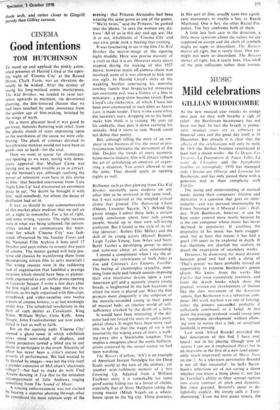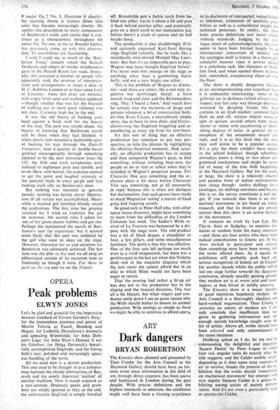MUSIC
Mild celebrations
GILLIAN WIDDICOMBE
As the new musical year tweaks its strings into gear we may well breathe a sigh of relief: the Beethoven bicentenary has not been too bad. In fact the breath is prema- ture; musical years are as arbitrary as financial ones and the great day itself is 16 December. But already it is clear that the effects of the celebrations will only he mild, In 1969 the Berlioz business resurrected at least half a dozen works: the Ti, Drum, Les Troyens, La Damnation de Faust, Lill°. La
litort de Cleopeure and the Symphonie funi,bre et triomphale: 1970 has managed only Christus am 011ierge and Leonora for Beethoven. and has only passed these with a generous nod at their complicity with Fidelio.
The rating and understanding of musical works during their composers' lifetime and thereafter is a question that goes on inter- minably—and was pursued interminably by Ernest Newman in A Musical Critic's Holi- day. With Beethoven, however, it can be kept under control more neatly because he is the one composer whose music has never declined in popularity. If anything the originality of his music has been exagger- ated: but at least this means it has had a good 150 years to be explored in depth. It was therefore not churlish but realistic to dread the excavation of secondary works.
However, by dismissing the sharp division between good and bad with a shrug of 'That's genius' we have probably missed an opportunity to examine Beethoven's genius afresh. We know, from the works like Fidelie that were extensively rewritten, and from the sketch books which show the gradual, written-out development of themes like the slow movement of the Kreutzer sonata, that Beethoven was a laborious com- poser. His work method was one of forcing; either the process succeeded, probably if sufficiently continued; or it failed. At this point the average textbook would sweep into his 'symphonic development' without allow- ing time to notice that a link, or analytical foothold, is missing.
Last week Alfred Brendel provided the best description of this link I have ever heard: not in his playing (though now of course I can see it emphasised there) but in an interview in the first of a new (and appar- ently much improved) series of Music Now on Bac-2. As a television personality Brendel is not all that successful: he lacks Baren- boim's infectious air of not caring a damn whether you know a thing about it; nor has he Tortelier's ability to filter sensual rapture into every contrast of pitch and dynamic. But once grasped, Brendel's point is de- lightfully explicit. He simply calls it 'Fore- shortening.' Even the first piano sonata, the F major Op 2 No. 1, illustrates it clearly: the opening theme is broken down into units that become increasingly shorter. He applies this description to many components of Beethoven's work, and claims that it con- tinues as a characteristic throughout his entire life. No one, so far as Brendel knows, has previously come up with this observa- tion. Its possibilities are fascinating.
I wish I could say as much of the `Beet- hoven Today' concert which the Scratch Orchestra and others of similar mindlessness gave in the Purcell Room last week. Ironic- ally, this attracted a.number of people who apparently took the promise of interpreta- tions and arrangements to mean a dose of H. C. Robbins Landon or at least some Liszt or Loussier: many left after ten minutes, with angry brief cases and audience applause —though whether that was for the bravado of walking out or mere good riddance was not clear. Curiosity kept me to the end.
It was the old theory of bashing your head against a brick wall for the beauty of the stop. The pain was simple abuse; the beauty in knowing that Beethoven would still be there when they had finished. A white plastic tent revealed a deplorable pian- ist hacking his way through the Diabelli Variations; later a quartet of double basses growled unrecognisably through something claimed to be the slow movement from Op 132; the fifth and sixth symphonies were reduced to nightmare pulp and ramble, and so on. Here, with horror, the audience seemed to get the point and laughed viciously at the pastoral birds in crazy gargle and fate bashing itself silly on Beethoven's door.
But nothing was intended as genuine parody; nothing was faintly clever. Destrud- tion of all virtues was accomplished. Mean- while a masked girl fumbled blindly round the auditorium. The first time her groping touched me I tried an expletive but got no response; the second time I asked for one of her green plastic bubbles and got one. Perhaps she represented the search of Beet- hoven's soul for expression; but it seemed more likely that this part was rendered by the girl who went to sleep on the stage. However, liberation for us and salvation for Beethoven was ultimately achieved. The last item was the Ode to Joy and we all sang an abbreviated version of its recurrent tune as frantically as though it were. For those in peril on the sea and we on the Titanic.







































 Previous page
Previous page